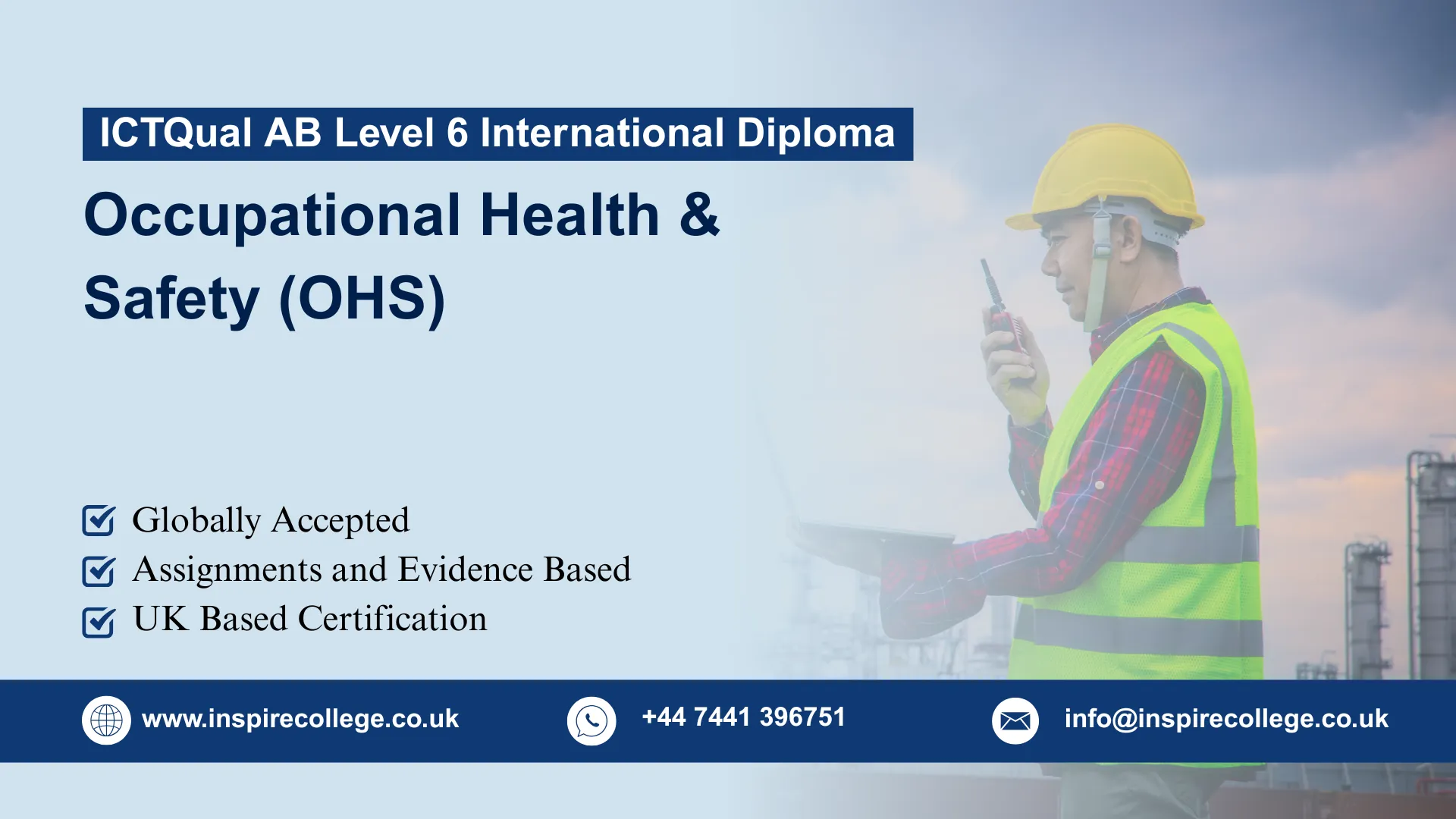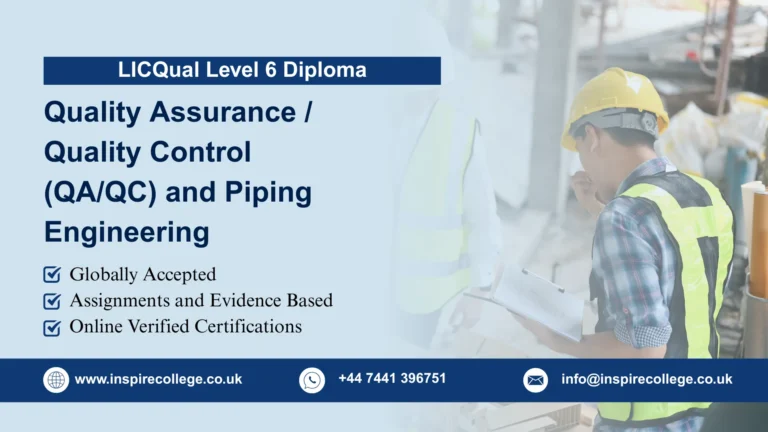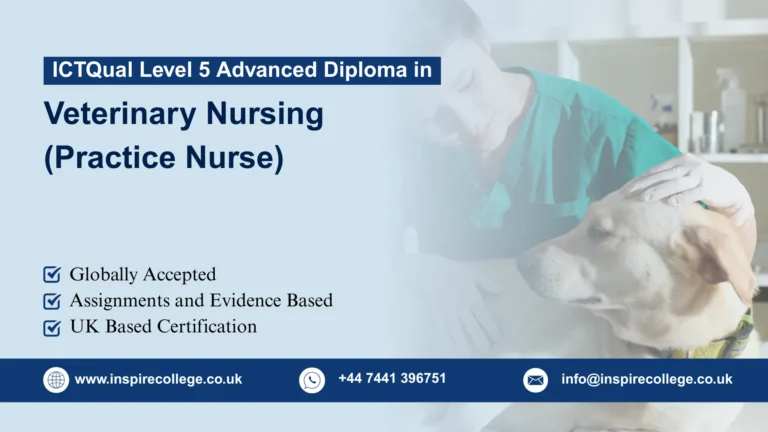
ICTQual AB Level 6 International Diploma in Occupational Health & Safety (OHS)
The ICTQual AB Level 6 International Diploma in Occupational Health & Safety (OHS) is a premier three-year, 360-credit programme designed to equip learners with advanced expertise in workplace safety and risk management. Recognised internationally, this qualification is ideal for both freshers aspiring to enter the occupational safety sector and seasoned professionals aiming to enhance their career trajectory.
Throughout the programme, learners gain comprehensive knowledge in identifying workplace hazards, implementing risk control measures, understanding global health and safety legislation, and developing effective safety management systems. The curriculum combines theoretical insights with practical applications, ensuring graduates are ready to address real-world occupational safety challenges across diverse industries.
By completing this diploma, learners unlock a wide range of career opportunities, including roles such as Health and Safety Officer, OHS Consultant, Compliance Manager, and Safety Coordinator. The programme fosters critical thinking, leadership, and regulatory compliance skills, empowering professionals to drive organisational safety initiatives and improve operational efficiency.
Key benefits of the ICTQual AB Level 6 International Diploma in OHS include enhanced employability, international recognition, and mastery of industry-relevant tools and techniques. Graduates emerge with the confidence and competence to implement robust safety strategies, influence workplace policies, and contribute significantly to organisational risk reduction.
With a globally informed curriculum tailored to the latest occupational health and safety standards, this diploma offers an unmatched pathway for learners seeking long-term professional growth. Whether you are beginning your career or aiming to progress to senior safety management roles, this programme provides the skills, knowledge, and recognition needed to succeed in today’s competitive international job market.
- Minimum Age: Learners must be at least 18 years old at the start of the programme.
- Educational Background: Applicants should have a recognised Level 5 qualification (such as a Higher National Diploma, Foundation Degree, or equivalent) in a relevant field. Equivalent professional certifications or diplomas in occupational safety, health, engineering, or related disciplines may also be considered.
- Professional Experience:
- Freshers: Those with relevant educational qualifications but limited work experience are eligible to enrol.
- Professionals: Applicants with at least 2–3 years of verifiable work experience in health and safety, risk management, industrial operations, or related sectors will be considered.
- Additional Requirements:
- Proficiency in English, both written and spoken, to engage effectively with course materials and assessments.
- Basic computer literacy, including familiarity with Microsoft Office and online learning platforms, for accessing study resources and submitting assignments.
- Commitment to a three-year programme and the ability to manage a 360-credit curriculum, including assessments, projects, and practical exercises.
This entry profile ensures learners are well-prepared to succeed in the internationally recognised diploma while meeting professional standards and industry expectations.
Mandatory Units
This qualification, the ICTQual AB Level 6 International Diploma in Occupational Health & Safety (OHS), consists of 36 mandatory units.
Year 1 – Foundation of Industrial Safety & Risk Management
- Principles of Industrial Safety Management
- Introduction to Risk Management in Industrial Environments
- Occupational Health and Industrial Hygiene Fundamentals
- Workplace Hazard Identification and Control Measures
- Safety Legislation and Regulatory Compliance
- Fire Safety and Emergency Preparedness
- Manual Handling and Ergonomic Safety
- Communication and Reporting in Safety Management
- Environmental Safety and Sustainability
- Electrical and Mechanical Safety Awareness
- Incident Investigation and Root Cause Analysis
- Professional Ethics and Responsibility in Safety Practice
Year 2 – Applied Industrial Safety & Risk Management
- Advanced Risk Assessment and Hazard Control
- Safety Performance Monitoring and Auditing
- Process Safety Management and Hazardous Substances
- Industrial Safety in Manufacturing and Heavy Industries
- Safety Management in Construction and Energy Sectors
- Occupational Diseases and Preventive Measures
- Behavioural Safety and Human Factors
- Safety Culture Development and Change Management
- Safety Technology and Digital Tools
- Emergency Response Planning and Crisis Management
- International Legal and Regulatory Frameworks
- Research Methods and Data Analysis for Safety Management
Year 3 – Strategic Leadership in Industrial Safety & Risk Management
- Strategic Safety Leadership and Governance
- Integrated Management Systems (ISO 45001, ISO 14001, ISO 9001)
- Business Risk Management and Sustainability
- Advanced Occupational Health & Wellbeing Strategies
- Safety in Large-Scale Industrial Projects
- Corporate Social Responsibility and Ethical Safety Practices
- International Standards and Global Safety Frameworks
- Digital Transformation and Emerging Trends in Safety
- Policy Development and Implementation in Safety Management
- Research Project / Dissertation in Industrial Safety
- Professional Development and Lifelong Learning
- Capstone Project: Practical Application of Safety Leadership
Learning Outcomes for theICTQual AB Level 6 International Diploma in Occupational Health & Safety (OHS) 360 Credits – Three Years:
Year 1 – Foundation of Industrial Safety & Risk Management
Principles of Industrial Safety Management
- Understand fundamental principles and concepts of industrial safety.
- Analyse organisational safety structures and responsibilities.
- Identify key factors influencing workplace safety culture.
- Apply basic safety management strategies in industrial settings.
Introduction to Risk Management in Industrial Environments
- Explain risk assessment methodologies and frameworks.
- Identify potential hazards in industrial operations.
- Develop risk control measures to mitigate workplace hazards.
- Evaluate effectiveness of risk management practices.
Occupational Health and Industrial Hygiene Fundamentals
- Understand occupational health hazards and exposure risks.
- Recognise the principles of industrial hygiene.
- Implement basic preventive measures to protect employee health.
- Analyse workplace environments for health and hygiene compliance.
Workplace Hazard Identification and Control Measures
- Identify common workplace hazards across industries.
- Assess risks and prioritise control measures.
- Apply hierarchy of controls to mitigate hazards.
- Monitor effectiveness of hazard control interventions.
Safety Legislation and Regulatory Compliance
- Understand national and international occupational safety laws.
- Apply legal frameworks to workplace safety practices.
- Ensure compliance with statutory requirements.
- Evaluate implications of non-compliance in industrial contexts.
Fire Safety and Emergency Preparedness
- Understand fire risks and fire prevention strategies.
- Develop emergency preparedness and response plans.
- Conduct fire risk assessments and drills.
- Evaluate effectiveness of emergency protocols in different scenarios.
Manual Handling and Ergonomic Safety
- Recognise risks associated with manual handling tasks.
- Apply ergonomic principles to reduce injury risk.
- Implement safe lifting and handling techniques.
- Evaluate workplace ergonomics and recommend improvements.
Communication and Reporting in Safety Management
- Develop effective communication strategies for safety management.
- Prepare accurate safety reports and documentation.
- Facilitate safety briefings and awareness programs.
- Analyse communication effectiveness in promoting a safety culture.
Environmental Safety and Sustainability
- Understand environmental hazards in industrial operations.
- Apply sustainable practices to minimise environmental impact.
- Assess environmental risk and regulatory compliance.
- Promote organisational responsibility for environmental safety.
Electrical and Mechanical Safety Awareness
- Identify common electrical and mechanical hazards.
- Implement safe working practices around machinery and equipment.
- Apply preventive and protective measures to avoid accidents.
- Conduct safety inspections for mechanical and electrical systems.
Incident Investigation and Root Cause Analysis
- Investigate workplace incidents systematically.
- Apply root cause analysis techniques.
- Develop recommendations to prevent recurrence.
- Evaluate incident reports for organisational learning.
Professional Ethics and Responsibility in Safety Practice
- Understand ethical principles in occupational health and safety.
- Promote professional integrity and responsibility.
- Analyse ethical dilemmas in safety decision-making.
- Foster a culture of accountability and ethical safety practices.
Year 2 – Applied Industrial Safety & Risk Management
Advanced Risk Assessment and Hazard Control
- Conduct complex risk assessments in industrial settings.
- Design advanced hazard control strategies.
- Evaluate effectiveness of implemented controls.
- Integrate risk management into organisational processes.
Safety Performance Monitoring and Auditing
- Develop safety performance metrics and indicators.
- Conduct internal and external safety audits.
- Analyse audit findings to improve safety practices.
- Report safety performance effectively to stakeholders.
Process Safety Management and Hazardous Substances
- Understand process safety management principles.
- Identify hazards associated with chemicals and hazardous materials.
- Apply control measures to minimise process-related risks.
- Ensure compliance with hazardous substance regulations.
Industrial Safety in Manufacturing and Heavy Industries
- Identify industry-specific safety hazards.
- Apply safety management techniques in manufacturing environments.
- Implement preventive measures for heavy industrial operations.
- Evaluate safety performance and continuous improvement strategies.
Safety Management in Construction and Energy Sectors
- Understand safety challenges in construction and energy industries.
- Apply risk management strategies specific to these sectors.
- Develop emergency and contingency plans.
- Promote safety culture in high-risk industrial environments.
Occupational Diseases and Preventive Measures
- Recognise common occupational diseases and their causes.
- Implement health surveillance and preventive programs.
- Promote employee wellbeing and safety awareness.
- Analyse trends to reduce occupational illness incidence.
Behavioural Safety and Human Factors
- Understand human factors influencing workplace safety.
- Analyse behavioural causes of accidents.
- Apply strategies to promote safe behaviours.
- Develop training and awareness programs targeting human factors.
Safety Culture Development and Change Management
- Assess organisational safety culture.
- Develop initiatives to strengthen safety culture.
- Manage change and overcome resistance in safety improvement.
- Evaluate impact of culture on safety performance.
Safety Technology and Digital Tools
- Understand digital tools for safety management.
- Apply technology for monitoring and reporting hazards.
- Analyse safety data for decision-making.
- Promote digital transformation in workplace safety practices.
Emergency Response Planning and Crisis Management
- Develop comprehensive emergency response plans.
- Coordinate crisis management strategies in industrial settings.
- Conduct drills and evaluate response effectiveness.
- Apply lessons learned to enhance preparedness.
International Legal and Regulatory Frameworks
- Compare international safety standards and legislation.
- Apply global regulations to local industrial practices.
- Evaluate implications of cross-border compliance requirements.
- Promote adherence to international occupational health standards.
Research Methods and Data Analysis for Safety Management
- Understand research methodologies in safety management.
- Analyse safety data using quantitative and qualitative methods.
- Apply research findings to improve workplace safety.
- Develop evidence-based safety policies and recommendations.
Year 3 – Strategic Leadership in Industrial Safety & Risk Management
Strategic Safety Leadership and Governance
- Demonstrate leadership in organisational safety initiatives.
- Develop governance frameworks for effective safety management.
- Align safety strategy with organisational objectives.
- Evaluate leadership impact on safety culture and performance.
Integrated Management Systems (ISO 45001, ISO 14001, ISO 9001)
- Understand integrated management system standards.
- Implement and audit ISO-compliant safety systems.
- Ensure alignment between safety, quality, and environmental management.
- Promote continuous improvement through integrated systems.
Business Risk Management and Sustainability
- Integrate business risk management with safety strategy.
- Assess long-term sustainability and organisational risk exposure.
- Apply proactive measures to mitigate operational risks.
- Evaluate safety initiatives’ contribution to corporate sustainability.
Advanced Occupational Health & Wellbeing Strategies
- Develop programs to promote workforce health and wellbeing.
- Implement preventive and wellness strategies.
- Analyse occupational health trends and emerging risks.
- Evaluate effectiveness of health and wellbeing interventions.
Safety in Large-Scale Industrial Projects
- Apply safety management principles to complex projects.
- Identify risks in multi-site and large-scale operations.
- Implement safety governance for project teams.
- Monitor and report safety performance in project environments.
Corporate Social Responsibility and Ethical Safety Practices
- Integrate CSR initiatives into occupational safety strategy.
- Promote ethical practices in workplace health and safety.
- Evaluate organisational impact on communities and employees.
- Develop CSR-aligned safety policies and programs.
International Standards and Global Safety Frameworks
- Analyse global occupational safety standards.
- Apply international frameworks to local industrial contexts.
- Ensure compliance with multinational safety requirements.
- Promote global best practices in workplace safety.
Digital Transformation and Emerging Trends in Safety
- Explore emerging technologies in safety management.
- Implement digital tools for risk monitoring and reporting.
- Evaluate trends shaping the future of occupational health.
- Promote innovation in safety practices through technology.
Policy Development and Implementation in Safety Management
- Develop effective organisational safety policies.
- Implement and monitor safety strategies.
- Align policies with legal, ethical, and business requirements.
- Evaluate policy impact on organisational safety outcomes.
Research Project / Dissertation in Industrial Safety
- Conduct independent research on a safety management topic.
- Analyse and interpret safety data rigorously.
- Present evidence-based recommendations for practice improvement.
- Demonstrate critical thinking and research competence.
Professional Development and Lifelong Learning
- Plan ongoing professional growth in occupational health and safety.
- Apply reflective practices to enhance skills and knowledge.
- Engage with industry trends and continuous learning opportunities.
- Demonstrate commitment to professional ethics and lifelong learning.
Capstone Project: Practical Application of Safety Leadership
- Apply accumulated knowledge to a real-world safety challenge.
- Demonstrate leadership, problem-solving, and strategic planning skills.
- Evaluate outcomes and implement improvements.
- Present findings in a professional, industry-relevant format.
The ICTQual AB Level 6 International Diploma in Occupational Health & Safety (OHS) is designed for individuals who are motivated to build a successful and sustainable career in industrial safety, workplace health, and risk management. This internationally recognised programme is suitable for a diverse range of learners, providing the skills, knowledge, and credentials needed to excel in both local and global occupational safety roles.
Emerging Professionals
- Individuals seeking to enter the occupational health and safety sector.
- Learners eager to gain comprehensive theoretical knowledge and practical, hands-on skills in industrial safety and risk management.
- Those aiming to lay a strong foundation for a long-term career in workplace health and safety.
Industry Practitioners
- Professionals currently working in construction, manufacturing, energy, or industrial operations.
- Individuals seeking to progress into senior roles such as Health and Safety Officer, Compliance Manager, or Safety Consultant.
- Learners aiming to enhance their expertise in risk assessment, regulatory compliance, and safety management systems.
Career Changers
- Individuals transitioning from other disciplines into occupational health, safety, or environmental management.
- Those looking to acquire internationally recognised qualifications to validate their skills and knowledge.
- Learners motivated to develop practical competencies and industry-ready expertise in workplace safety.
Aspiring Leaders
- Professionals who aim to influence and improve organisational safety culture.
- Individuals looking to implement robust safety strategies, ensure compliance, and drive sustainability initiatives.
- Learners focused on strategic leadership in occupational health and safety, preparing for senior management and consultancy roles.
Why This Course is Ideal
- Provides a globally recognised qualification that enhances employability and professional credibility.
- Offers a combination of practical, applied learning and strategic safety management knowledge.
- Prepares learners for a wide range of career opportunities across multiple industries worldwide.
- Suitable for those committed to continuous professional growth and lifelong learning in occupational health and safety.
As an ICTQual AB Approved Training Centre, we offer learners two flexible pathways to achieve the Level 6 International Diploma in Medical Laboratory Technology. All learners must register with our centre to enrol and access course materials.
Route 1 – Experienced Professionals
Designed for learners with at least 6 years of verifiable professional experience in medical laboratory operations, diagnostics, or related healthcare sectors. Key features include:
- Submission of evidence demonstrating competence in:
- Laboratory practices and diagnostic testing
- Quality control procedures
- Regulatory compliance and safety standards
- Evaluation of existing skills and knowledge against the diploma’s learning outcomes by our centre.
- Targeted guidance or additional training provided if knowledge gaps are identified.
- Fast-tracked certification without the need to complete all 36 assignments.
- Recognition of professional experience with a globally recognised qualification.
Route 2 – Fresh Learners
Designed for learners without prior professional experience in medical laboratory science. Key features include:
- Completion of the full three-year, 360-credit programme.
- Completion of all 36 assignments, including:
- Case studies
- Practical assessments
- Theory-based tasks
- Demonstration of both theoretical knowledge and practical laboratory skills in real-world medical and clinical settings.
- Award of the ICTQual AB Level 6 International Diploma in Medical Laboratory Technology upon successful completion.
Key Benefits of Both Routes
- Globally recognised and industry-relevant qualification.
- Flexibility to validate prior professional experience or gain comprehensive expertise.
- Prepares learners to advance careers in medical laboratory technology, clinical diagnostics, and healthcare services.
Register Now
FAQs for ICTQual AB Level 6 International Diploma in Occupational Health & Safety (OHS)






